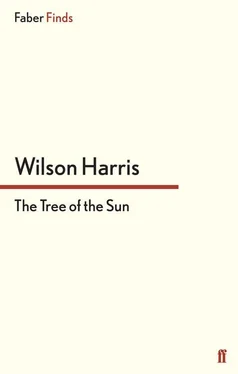“What is one’s time? Had one lived before, in some past age, would one have belonged in a way one does not now belong? Or is it that one lives ahead of one’s time in correspondence with a time to which one truly belongs?” she wrote in her first letter to Francis.
The house in Holland Park Gardens/Addison Road in which da Silva was to unearth that letter, and the other letters she wrote, had been partly enlarged, partly demolished, until one wondered: was it he who had discovered her timeless body, within opened postbox or panel, or she who had prepared herself for the touch of his hand, before it came into existence, as an extension of herself into the myths of enlarged/demolished existence?
There were moments when, in that body of myth, she came to Kensington Gardens to renew parallel expeditions, to be surrounded by invisible courtiers of the past and the future; moments when the nagging depression from which she suffered in her living, unliving, grave, lifted all of a sudden: a lift that could occur in a flash for no logical reason it seemed. Her blood would suddenly sing. Her limbs would appear to rise, to dance, in the air. Every care and foreboding of miscarriage of a soul would vanish. Music would strike up in the leaves, within radiating walks from the Round Pond down to the Serpentine, at the edge of a great wheel of sound, that spun and did not spin into vistas of oceanic blue, stitched to copper beech trees, or into avenues of lime, or through Matthew Arnold’s “black-crown’d, red-boled pine-trees”, or in a bubbling green wave of pink and white blossom on horsechestnut.
She possessed no key to this sudden enchantment. It came of its own. It went of its own. It filled her with sorrow, with expectancy that sooner or later it would come again, she would fly again. And this expectancy led her to conceive a reader and companion in exile, in the midst of sorrow, a reporter to whom she was inevitably attached before she was born, someone to whom she could confide the mystery of another world from which she had been parted (the mystery of joy when the parting veil was lifted and the kingdom of god and its overlapping mirror, the womb, visited her, of its own accord; extraordinary bliss flowed out of common-or-garden trees or lawns).
Sometimes, in an abstract moment, she wrote of it in her letters as an island far away, a place of romantic beauty, studded with palms, a vista of blue sea, a conical mountain swathed in the subtlest web of green and purples and blues. It was a place that had no existence; yet it was real; it could change its hue or tone into a majestic waterfall or into a subterranean cavern in the middle of a forest. It was a substitute gateway into her own body, into mixed elements, mixed ancestries, and into the foetus of the gods she dreamt to conceive.
There were other times when she saw Francis as both intimate and stranger lodged in the gateway of her bed. His tenderness for her concealed an anxiety about her health physical and mental. No wonder he never shared completely — she was never tired of confessing it in her letters — her desire to have a child. It was as if he saw through her masks of Europe into a darker potential, a heterogeneous potential, that aroused him to distrust appearances, to hate her susceptibility to gardens and walks and lakes as if they could sublimely harbour a foetal procession of demons.
“Hate” was too strong a word for it. “Love” was stronger still (and “jealousy”? who could say?) for, in point of fact, he often accompanied her and was filled with a pleasure, all the greater for his jealous misgivings, when he saw her states of sudden relief and pleasure. Indeed this “double pleasure” within them was a mutual gateway into several countries of the heart and mind — several mistresses and masters of the heart and mind — by which or whom they were accepted and yet from which or whom they had been banished.
Julia had once confided to him (and it had aroused his most frightful misgivings as if his authority were being challenged) her feeling of the partial exile of unseen populations, famished souls, from both the city of god and the kingdom of the womb.
“It is this feeling”, she said softly but urgently, “that accounts in part for my ups and downs Francis, my elations and depressions. If only I had a key … the city of god would then absorb an overflow of sorrows from the spectre of the womb.”
“Good god Julia,” said Francis, “what heresy is this?” He had spoken harshly but when he saw the tears in her eyes he desisted and apologised. He hardened himself paradoxically into “will-to-tenderness”. But she had witnessed a blaze in his manner she would never forget and it led to her increasing cultivation of her daemon-artist, daemon-lover, with whom she spoke at times through him and through the barrier of years. Voices Francis sometimes heard until he was driven to distraction by them as if, on the other side of the conical mountain of Julia’s existence, he was aware of an unconscious fire that ran through the mutual book of their lives — unlived and lived lives — into canvases already painted by a painter of the future, sculptures already sculpted by a sculptor of the future. And though Julia was unaware of it it fired and confirmed his ambitions and the book on which he had been engaged even before they met on the West Indian island of Zemi.
*
The first very long letter she wrote (like a chapter in a book) had been written within a year of their marriage.
She had had her first miscarriage; she had had a fever, a substratum of malaria, which was to dog her steps, confine her to bed from time to time, in the years ahead.
One summer day they quarrelled. He turned from her abruptly. It was a mild quarrel into which they had slipped; and yet there was that sudden blaze in his eyes she never forgot which left her with the inconclusive flavour of ramifications and architectures of conflict between man and man, man and woman, woman and woman, as if they had been shot , out of the blue, conscripted by a jealous bullet, the miscarriage of a word into feuding poetical elements, earth-poem, sky-poem, water-poem.
As if nevertheless in plumbing that subtle miscarriage of deity’s word, a child of the imagination was still being painted or sculpted or symphonically conceived to confront a merciful hiatus or ineffectuality shared by all implacable creator elements, in subtly unfinished dialectical materials, in subtly miscarried dialectical materials, in parallel universes, that left a miraculous light or shade, sound or space, in which to envisage a far-reaching community of redress.
Each principle of redress, however, pinpointed the essential precariousness of the myths of the family of man, areas that needed extensive support, tolerance, resources of self-critical affection across divides of hate.
See how Francis became a stranger to her all at once — as if they had stepped back across centuries into unfamiliar bastions prior to states of mutual self-discovery — as he abruptly and coldly turned away from her, unconscious of the effects of his retreat into a “will-to-tenderness”, struck off in the direction of Hyde Park Gate and in an instant she dreamt that all the bridges of generations had collapsed across oceans and she would never see him again.
He would return, she knew, and yet she sat in a chair in the park as if it were the end of the world (as if the world she still knew had never really begun). She became a rock woman on a rock ladder of a chair with a rock child to swing in her arms like eternity’s slingshot or cannon fodder.
The echoes of their quarrel seemed now to reach into Bayswater Road with its rush and its traffic. They would be home for dinner she knew. They would drive and chat as if nothing had happened. The taste of reconciliation was already on her palate; the taste of melting seed or bone, renascence of inconclusive flesh, through which to initiate a secret conversation with da Silva about re-creative fissures in a dialectical body of rock.
Читать дальше












